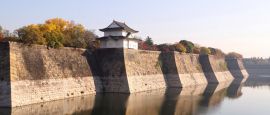Osaka Castle stands tall on the Uemachi Daichi Plateau, the oldest inhabited place in Osaka. The castle itself is a reproduction, having been destroyed in WWII. However, the massive walls around it are from the original structure. With its tall walls (up to 20m/66ft) and wide moats, Osaka Castle is arguably one of Japan's most imposing castles. There are eight shachihoko (fish tiger) figurines as well as ornamental roof tiles and tiger-shaped reliefs, which are all gilded with gold. The parkland by the castle is very pleasant, especially during the cherry blossom season in spring.
Things to see in Osaka
Tourist offices
Address: 5F Toda Building Shinsaibashi, 4-4-21, Minamisemba, Chuo-ku, Osaka, 542 0081, Japan
Tel: +81 6 6282 5900.
www.osaka-info.jp/en
There are also visitor information centres at JR Shin-Osaka Station on the 3rd floor (tel: +81 6 6131 4550) Umeda (tel: +81 6 6440 3899), Namba (tel: +81 6 6131 4550) and Kansai International Airport (tel: +81 7 2456 6160). Staff at all of these centres can help with information about transport, accommodation and the city's many attractions.
The Osaka Amazing Pass (www.osp.osaka-info.jp) is a special card for international visitors that offers unlimited use of the subway, trains and buses in and around Osaka. The pass includes free admission to more than 40 sights and special deals at restaurants and shops. The pass is available for either one or two days and can be purchased at Visitor Information Centres, hotels, subway station kiosks and private railway stations.
Osaka's Sumiyoshi Taisha is one of the country's oldest shrines and the headquarters for the more than 2,300 Sumiyoshi shrines throughout Japan. It was established in the third century and represents an original form of Japanese architecture that is distinct from the Chinese and Korean influences seen in temple design.
Osaka's Universal Studios theme park, one of only two outside of the USA, features rides and shows associated with famous Hollywood movies and TV programmes. The park's attractions include a The Wizarding World of Harry Potter, Hello Kitty's Fashion Avenue and various rides. The park also offers guided tours, themed restaurants and shops selling a wide range of souvenirs.
The observation platform of this observatory connects the two towers of the Umeda Sky Building some 173m (567ft) above ground level. The views of the city are fantastic. In bad weather, the open-air top floor is closed, but the views from one floor below are still great. The scariest bit is the escalator up the last five floors. It crosses over from one tower to the other, giving a strange sensation of moving into the open air.
One of three national contemporary art museums in Japan, the National Museum of Art in Osaka holds exciting exhibitions of both well-known and up-and-coming Japanese artists, as well as established international artists. The entrance to the museum is quite striking – steel poles bent into a fish-like shape. The museum’s galleries are housed in three subterranean floors.
The Kaiyukan is one of the largest aquariums in the world and is contained in a unique architectural structure shaped like a butterfly. A complex of over 15 water tanks centred on a single huge tank holding 5,400 tonnes of water, it is home to 620 species and 30,000 marine animals from the Pacific Rim. The biggest tank even holds a giant whale shark, the world's largest fish. Osaka’s aquarium is an award-winning aquarium that will fascinate both adults and children.
Shitenno-ji Temple is one of the earliest Buddhist temples in Japan. None of the buildings originally erected in AD593 have survived, although the classical layout of the complex is still visible. The temple precincts contain charming turtle ponds and a lovely example of a five-storey pagoda.
This Osaka museum has a fascinating collection of Japanese, Chinese and Korean antique ceramics from the major artistic periods. From archaeological artefacts to the most refined examples of ceramic techniques, the museum’s excellent displays are informative and show the economic and cultural connections throughout East Asian history.
This excellent museum is located just outside Osaka Castle Park. Each of the floors represents a different period in Osaka's history, except for the top floor, where the inside of the Naniwa-no-Miya Palace has been recreated. Osaka's 1,400-year history comes to life thanks to the creative layout and interactive displays at this museum.
Opened in 1989, the Osaka Science Museum offers a fascinating glimpse into the world of science by focusing on what we know about the universe and the energy within it. Here you can learn about electricity, the size of the planets and your own reflexes. The museum's planetarium is able to project 28,000 stars on one of the world's largest dome screens (with a diameter of 26.5m/87ft).
Do you have any Feedback about this page?
© 2026 Columbus Travel Media Ltd. All rights reserved. No part of this site may be reproduced without our written permission, click here for information on Columbus Content Solutions.








 You know where
You know where